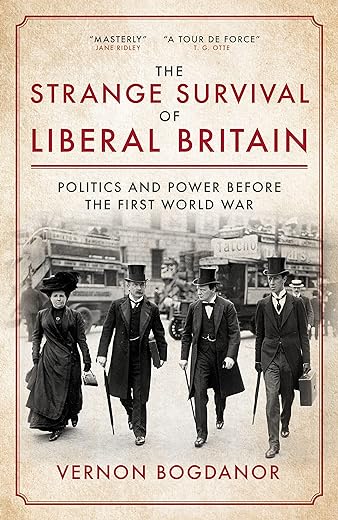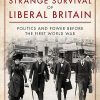The Strange Survival of Liberal Britain: Politics and Power Before the First World War
£8.50£33.30 (-74%)
“Masterly … A fascinating tour d’horizon of the Edwardian political scene. This must be a definitive account.” – Professor Jane Ridley, author of George V: Never a Dull Moment
“A tour de force, sympathetic in its treatment of the subject, eminently wise in its judgement and invariably fair in its verdicts. It purrs along like a Rolls-Royce engine.” – Professor T. G. Otte, author of Statesman of Europe: A Life of Sir Edward Grey
“This brilliant book from Britain’s most important constitutional historian upends the orthodoxy about the decadent Edwardians. A masterpiece of intelligent history, both forceful and subtle, which transforms how we view not just those most complex Edwardians but also our own equally complex times.” – Professor Richard Aldous, author of The Lion and the Unicorn: Gladstone vs Disraeli
“Brilliant. Instantly the leading history of this turbulent and critical period in Britain’s transition towards a modern democracy.” – Professor Robert Blackburn, King’s College London
“Vernon Bogdanor has the habit of unearthing gems that have been missed by others. He does it again in this magisterial work on post-Gladstonian Britain by challenging some of the long-established myths about this period that deserve to be cast aside.” – Professor Malcolm Murfett, King’s College London
“Professor Bogdanor argues with conviction and sometimes passion but always with judiciousness and in the light of deep reflection. The result is a masterly work which speaks to the politics of our own time.” – Alvin Jackson, Richard Lodge Professor of History, University of Edinburgh
“An extraordinary exploration of a political world whose dynamics continue to shape the future of liberal constitutionalism.” – Bruce Ackerman, Sterling Professor of Law and Political Science, Yale University
“Crisp, authoritative and lucid.” – Nicholas Owen, associate professor of politics, University of Oxford
The turbulent years of 1895 to 1914 changed Britain’s political landscape for ever. They saw a transition from aristocratic rule to mass politics and heralded a new agenda which still dominates today. The issues of the period – economic modernisation, social welfare and equality, secondary and technical education, a new role for Britain in the world – were complex and difficult. Indeed, they proved so thorny that despite the efforts of the Edwardians they remain among the most pressing problems we face in the twenty-first century.
The period has often been seen as one of decadence, of the strange death of liberal Britain. In contrast, Vernon Bogdanor believes that the robustness of Britain’s parliamentary and political institutions and her liberal political culture, with the commitment to rational debate and argument, were powerful enough to carry her through one of the most trying periods of her history and so make possible the remarkable survival of liberal Britain.
In this wide-ranging and sometimes controversial survey, one of our pre-eminent political historians dispels the popular myths that have grown up about this critical period in Britain’s story and argues that it set the scene for much that is laudable about our nation today.
Read more
Additional information
| Publisher | Biteback Publishing (20 Oct. 2022) |
|---|---|
| Language | English |
| Hardcover | 912 pages |
| ISBN-10 | 178590762X |
| ISBN-13 | 978-1785907623 |
| Dimensions | 16 x 6 x 24 cm |










by Ted
At well over 800 pages of text, plus a lengthy and very useful summary of sources, this is a very considerable achievement, yet I found it in some ways quite unsatisfactory and I think this comes down to its shape and purpose. VB says its aim is to examine “the resilience and effectiveness of the British political system in the face of unprecedented challenges”. What we have is very long, largely conventional narrative with three very short sections of analysis – around 5 pages apiece – on whether England was near to civil war in 1914, on Grey’s foreign policy (where VB is unfashionably ‘pro’), and a concluding epilogue, which leaves one feeling short changed as to whether VB’s aim is met.
Basically, VB has covered everything, and not just what is pertinent to his aim. I feel it is particularly a mistake to have covered foreign affairs. First, that’s ground well covered elsewhere. Second, it’s just too much – and means we have a book that’s surely too big and too expensive to be a standard text. Third, it’s not woven in to the book terribly well: it’s fine early on – as chapters 2, 4, 6 and part of 8 – but then we get 400 pages straight on domestic policy, before stepping back from 1914 all the way to Lansdowne’s entente and finish off with a hundred pages of foreign policy. That’s just clumsily structured. And it’s not just in layout. The point of the Boer War, for a book like this, is surely not to have a narrative of the war, but to examine what that war demonstrated about the machinery of state, which for Balfour and Chamberlain was the lesson that there needed to be a wider financial base for Britain to be able to compete with other powers – the Boer War was the father of tariff reform, and VB doesn’t make the link.
VB apologises for being at times superficial, but we get a very useful narrative history of so many of the key events, from the Aliens Act through to the Ireland. What did surprise me was two omissions. First, there’s not a word of Curzon’s spat with Kitchener. Given we get, for example, the most complete account of the fall of George Wyndham that I’ve ever read, this seems odd, especially because the argument was about a constitutional issue, the oversight of the Indian army. Second, and far more of a lacuna, is the lack of coverage of military reform, either Lansdowne’s or the later Arnold-Forster/St John Broderick efforts, except – bizarrely – for the briefest reference to it being critically important. Nor is there anything on the navy, aside from references in the context of the budget implications. Given the limited role of the state in those days, the competency of the armed forces is a large part of answering VB’s question of whether the machinery of stage is working well. And all the more so given his conclusion is that there was a mismatch between foreign policy and defence policy, a conclusion not evidenced by examination of the latter.
The leading politicians are treated to brief, 2-3 page, profiles through the text. I’m not at all sure these work – they’re just too brief to be useful and again comes back to the purpose of the book: is this for a reader for whom the basics on e.g. Joe Chamberlain are necessary? I felt that it was in some of the individuals that VB’s own views come over: he obviously doesn’t rate Lord Salisbury, and his portrayal of Balfour is virtually of a cartoon villain, unrecognisable from any of the better biographies.
So in all, what is there is largely good, but it’s let down by its structure and it’s too long. I contrast this book with Robert Rhodes James’ ‘British Revolution’, of more than a generation ago, which I found immediately captivating and which got me through A level – I think that’s a less ambitious but at the same time more balanced work and an easier read.
by Michael
This is an exceptionally thorough descriptive analysis of the ways in which Britain’s governance adapted itself to the potentially destabilising challenges that arose in the late nineteenth and early twentieth century. Highly informed and acutely perceptive this highly-readable book is a first-rate piece of historical scholarship.
by David Yates
I do not wish to repeat what has already been written, in one case at an analytical length. I simple question who the author is trying to reach. As an academic who is specifically interested in the period from the turn of the century to July 1914, a significant amount of VB’s coverage has been more intensively dealt with in other leading works. Trying to cover domestic issues and foreign affairs in a somewhat haphazard manner, is ineffective.
I suspect that for the general history reader, perhaps academically up to A Level standard, it is useful, but any historians at degree level will not find anything in this weighty tome that cannot be found elsewhere.
The book lacks structure also and defined continuity.